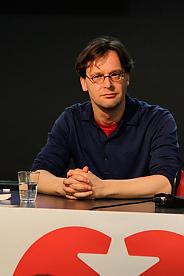Ronald van Raak: Democracy still in danger in Curaçao
Ronald van Raak: Democracy still in danger in Curaçao
The gambling industry continues to run the former Dutch colonies of Curaçao and Sint Maarten. The islands, now autonomous regions of the Kingdom of the Netherlands, must escape from under this shadow if they are to become mature democracies.
 Gerrit Schotte, condemned in March to three years’ prison, has once again been elected to the Curaçao parliament. This ex-Prime Minister’s party, which according to the judge was a ‘pawn’ of the gambling industry, won four of the twenty-one seats, the same total as the liberal PAR and the MAN, a party which in the past governed with Prime Minister Schotte and which on this occasion made the biggest gains. This election demonstrates that the influence of the gambling bosses on the beautiful island’s politics has certainly not disappeared.
Gerrit Schotte, condemned in March to three years’ prison, has once again been elected to the Curaçao parliament. This ex-Prime Minister’s party, which according to the judge was a ‘pawn’ of the gambling industry, won four of the twenty-one seats, the same total as the liberal PAR and the MAN, a party which in the past governed with Prime Minister Schotte and which on this occasion made the biggest gains. This election demonstrates that the influence of the gambling bosses on the beautiful island’s politics has certainly not disappeared.
In 2010 the islands of Curaçao and Sint Maarten became, as the Dutch colony of Aruba had previously done, autonomous countries. At the time the Netherlands offered a large amount of aid to its two former possessions, including writing off half a billion euros in debts. These countries remained, however, within the Kingdom of the Netherlands, which in reality gives our state responsibility for maintaining the rule of law and sound administration, yet without any clear agreements as to how we should accomplish this.
Our responsibility was established in 1954 in the Statute for the Kingdom which followed Indonesia’s independence and which was intended to offer support to the independence process in the remaining colonies. Suriname became independent in 1975, but the Antilles did not want seek independence. In 1986 Aruba opted for ‘autonomous’ status, but wanted to remain within the Kingdom. In 2010, Curaçao and Sint Maarten followed suit.
Mafia
The new political relationship meant that in both Curaçao and Sint Maarten politicians came to power who were in the pay of the international gambling corporations, often linked to the mafia. An example is provided by Francesco Corallo, financier of Gerrit Schotte. Another is probably Theo Heyliger, whose party made the biggest gains in last week’s elections in Sint Maarten and took its place in the new coalition government.
Curaçao, with a population of 150,000 Sint Maarten. With 50.000 inhabitants, are very small countries, yet they have a lot to do with very big crime. Drug criminals, amongst others, use the islands to launder money, using for example lotteries and casinos. Hundreds of illegal gambling websites operate out of Curaçao, putatively involving billion in wagers on sporting fixtures. The gambling bosses also like to invest in local politics.
Dirty money
In 2013 the popular politician Helmin Wiels was murdered in Curaçao, following his attempts to reveal the extent of the gambling bosses’ influence. The enquiry into those who issued the contract for this killing continues. One of the suspects is former Minister of Justice Elmer Wilsoe, a party colleague of Wiels. Another suspect is gambling baron Robbie dos Santos, who was recently ordered to pay a fine of €36 million for money-laundering.
The fact that Schotte was not re-elected as prime minister in these elections does not mean that the gambling industry’s influence has disappeared. Together with a fellow MP, André Bosman of the VVD, I asked our government to launch a criminal investigation into the gambling industry in Curaçao and Sint Maarten, with the aim of removing dirty money and politicians with dirty hands from the islands. That investigation has now been carried out, in close cooperation with the US.
Curaçao had a bad start with in 2010 with Schotte as Prime Minister, but may now have a second chance. I hope that the MAN party will succeed in forming a new coalition of MPs who are not hand-in-glove with the gambling industry, but together with the Netherlands want to make public the links between government and underworld. We must now free Sint Maarten from the gambling bosses, or these islands will never have the chance to become mature democracies.
This article first appeared, in the original Dutch, on October 8th in the national daily Trouw
- See also:
- World
